Teaching your students about personal responsibility will be one of the most important lessons you’ll impart. Having this sense of personal accountability will set them up for success as they grow, both in school and at home. In fact, personal accountability actually plays a big role in creating a collaborative classroom for everyone.
But beginning the process of teaching personal responsibility in the classroom doesn’t have to be a daunting task. Skills like time management, prioritization, and organization are all a part of creating responsible students. You can help build these skills in small increments through the work they do on a daily basis.
Here, experienced fifth grade teachers Joe Saenz and Wandiza Williams share how they help their students become more responsible, both academically and personally.
When students know what to expect, they will be more likely to prepare everything they need for class, whether they’re in charge of their own classroom jobs or need to get their homework done.
“Set up classroom routines with clear expectations,” says Saenz. “Do not just go over these routines at the beginning of the year. At the start of each marking period, review your classroom routines and expectations. If your students see that you are serious about a routine and you clearly define it, they will follow it.”
It’s also important to define that these expectations have consequences if they aren’t met. For example, each student should be responsible for turning in their homework and classwork on time.
“In my classroom, it is my students’ responsibility to explain to me why they do not have their homework completed when it is due,” says Saenz. “If they communicate their reasoning and share their plan to make it up, I will not contact their parents. If they routinely fail to explain their reasoning and their plan, I will reach out to their parents to keep them apprised. This sets up responsibility and accountability in your class.”
Taking the time to speak with your students about their homework and responsibilities will clue you into how they’re doing and will help establish personal accountability.
“Morning meetings are a great time and way to address this on a consistent basis within the classroom,” says Williams. “In other words, feedback is extremely important. We want students to be actively involved in the learning process, take pride in their work, and recognize that hard work pays off.”
By using this time to have a conversation about what they’re excelling in and what they can improve, students will be more open to accepting all kinds of feedback as they grow.
“Being held accountable is a good thing, but may not feel good if you have to be called out,” says Williams. “It is one of life's vital lessons for perseverance and success. You have to be open-minded to accepting feedback and applying it to make you better, progress, and grow as a learner.”
While critiquing performance is helpful, reminding your students that they’re doing a good job is essential to their success. Just like adults, children respond better when they know they are appreciated and doing a good job. This is why having open channels of regular communication is essential.
“Remember, students may feel ‘picked on’ or ‘attacked’ when you hold them accountable,” says Saenz. “It is vitally important that you communicate. If you show your students respect and treat them fairly as you would with any other student, you will earn their respect and create strong and trusting relationships. Your students should feel comfortable coming to your class, not fear to do so.”
When met with positive reinforcement, students will be more willing to take initiative and understand that they have influence over their grades and performance in class, which gives them a feeling of control.
“Some students appreciate it and others have a hard time,” says Williams. “Some students may feel that you are picking on them or being overly critical of their work, behavior, and/or performance. This is why it is important to have conversations with students to explain to them what's happening and to get their input as well.”
Shop books about responsibility below! You can find all books and activities at The Teacher Store.













